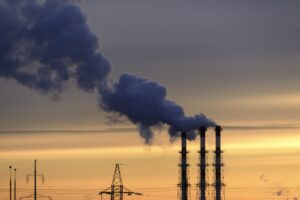Natural gas has long been sold as the “clean” fossil fuel — the friendlier cousin of coal and oil. Politicians and industry lobbyists frame it as a “bridge fuel” to get us to renewables. But bridges can collapse if they’re built on weak foundations. The truth is, natural gas carries its own environmental costs, and they’re bigger than the glossy ads suggest.
What Is Natural Gas?
Natural gas is primarily methane, a hydrocarbon gas formed deep beneath the Earth’s surface. It’s found near oil deposits, in coal seams, and in shale formations. The modern boom in natural gas comes from hydraulic fracturing (fracking) — blasting water, sand, and chemicals underground to force the gas to the surface.
Industry boosters call it efficient. Environmental scientists call it risky. Both are right, but only one group is paying the long-term price.
Environmental Impacts of Natural Gas
The Fracking Problem
Fracking requires millions of gallons of water mixed with chemicals, many of them toxic. This cocktail is injected into the ground, fracturing rock and releasing trapped gas.
The risks? Groundwater contamination when those chemicals migrate into aquifers. Wastewater disposal that too often fails to meet safety standards. And entire ecosystems left vulnerable when spills or leaks occur.
Communities near fracking sites face increased risks of contaminated drinking water. Once poisoned, aquifers can take decades — if ever — to recover.
Air Pollution and Methane Leakage
Methane is natural gas’s dirty secret. Over a 20-year period, methane is 80 times more potent than carbon dioxide in trapping heat, according to the U.S. Environmental Protection Agency (EPA).
Leaks happen during drilling, transport, and even storage. While burning natural gas emits less CO₂ than coal, the methane leaks from its lifecycle erase much of that supposed climate advantage.
And it’s not just methane. Combustion also emits nitrogen oxides (NOx), contributing to smog and respiratory illness, along with fine particulate matter that can scar lungs for life.
Climate Change Consequences
The industry narrative claims natural gas is helping fight climate change by replacing coal. But “less bad” is not the same as good. Every ton of methane released accelerates global warming at a pace the planet can’t afford.
The International Energy Agency (IEA) warns that without aggressive methane controls, natural gas could derail the world’s climate goals entirely.
Strategies for Reducing Harm
Industry Technologies
Some companies now deploy advanced leak detection systems, infrared cameras, and drone-based methane monitoring to cut emissions. Others experiment with capturing fugitive methane to use as energy rather than letting it escape.
It’s progress — but patchwork progress. For every operator investing in clean tech, another cuts corners to save costs.
Regulation and Policy
Regulation is the lever that works. The U.S. EPA has introduced stricter rules requiring oil and gas companies to detect and repair methane leaks. Tax credits and R&D incentives can accelerate deployment of cleaner technologies.
But loopholes remain. Without enforcement, regulations become paperwork — not protection.
Public Pressure and Activism
Communities and activists have been critical in forcing companies and governments to act. Protests, lawsuits, and shareholder pressure have all pushed methane leakage onto the public agenda.
Public awareness is powerful. It drives divestment from natural gas expansion projects and creates momentum for renewable energy alternatives.
Why This Matters Beyond Natural Gas
The bigger picture is this: every dollar invested in new natural gas infrastructure locks us into decades of dependence on a fuel that still pollutes. That’s money not spent on wind, solar, storage, and efficiency — the real solutions.
Natural gas might burn cleaner than coal, but it still keeps us tethered to the fossil fuel era. And the climate clock is ticking too loudly to waste decades on “bridge fuels” that go nowhere.
Final Thoughts
Natural gas isn’t the clean solution it’s marketed to be. Yes, it emits less CO₂ than coal or oil, but its methane footprint, fracking-related water contamination, and air pollution tell a more complicated story.
The good news: alternatives are here. Renewables are cheaper than fossil fuels in most of the world, and storage technology is advancing rapidly. Natural gas is no longer a necessary bridge — it’s a detour.
If governments enforce stronger methane regulations, companies adopt transparent monitoring, and citizens continue to push for accountability, we can move past the greenwashing and accelerate toward a truly sustainable energy system.
Because in the end, there’s nothing “natural” about destroying the climate.









Reader Interactions